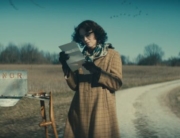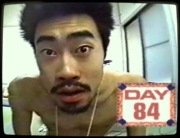Ulrich Seidl’s Paradise Trilogy was originally conceived as a single film of interwoven stories that follows three female family members on a quest during their separate summer vacations. While single mother Teresa looks for love on a Kenyan sex holiday in Love and her sister Anna Maria devotes her vacation to evangelizing in Faith, Paradise: Hope follows Theresa’s only child, Melanie, to an isolated “fat” camp in the Austrian mountains.
Thirteen–year-old Melli (Melanie Lenz) is dropped off by her Aunt Anna Maria at a cavernous, sterile, modernist school to spend her summer with 12 other overweight teens. She is weighted, measured, and put through fitness tests. Affable Melli soon makes friends with her three roommates, particularly the confident Verena (Verena Lehbauer) with whom she trades confidences and revelations. They have a ball flouting the rules with midnight food raids, smuggled beer, and riotous games of spin the bottle with other campers, while the sports teacher prowls the halls like a comic Terminator. Omnipresent and armed with his piercing whistle, he meters out military, endurance punishments for any infringements.
Regaled with Verena’s stories of sexual encounters, Melli is hungry for experience and develops an infatuation with the camp doctor, Artz (Joseph Lorenz), the silver-haired doctor who is old enough to be her absent father. Urbane Artz indulges Melli’s flirtation as her “appointments” become more frequent and her attention more overt, but when Melli naively attempts an awkward seduction, Artz’s professional veneer slips.
The relationship between newcomers Melanie and Verena is charming and truthful. Desperate to grow up, Melli is in awe of Verena’s experience, and the spirited teenagers egg each other on through their high and lows, unrealistic expectation, and inflated fantasies. Austrian stage veteran Joseph Lorenz plays Artz with perfect restraint. Seidl keeps the audience guessing as the doctor struggles for self-control.
Hope is dominated by Seidl’s static, symmetrically framed shots in the stark geometry of the vast school interior and counterpointed by handheld camera that captures the teenage escapades fueled by rebellion and alcohol.
Two woodland scenes recall the menace of a dark fairy tale. On a hike, the group stops to swim in a lake. With just a towel draped over her bikini, Melli lures Artz into the nearby woods. When Artz catches up with her, Melli’s suddenly unsure and out of her depth. As Artz falters between desire and restraint, Seidl maintains the tension, only breaking it when Melli gives Artz a parental hug.
In an excruciating scene, Melli and Verena escape to a seedy local bar loaded on Jägermeister. Provocatively dressed and monopolizing the deserted dance floor, Melli attracts the attention of a young opportunist. Flattered by his aggressive advances, she is clueless to the wager he has struck with his watchful friend and the danger she is in. When Artz collects Melli from the bar, she is unconscious. He takes her to a forest glade thick with morning mist, lays her out, gets down on all fours, and sniffs her before lying next to her.
Hope plays out in slow motion with Seidl’s understated telling, capturing documentary-style Melli’s naive fearlessness and Artz’s knowingly trepidation. The absence of Melli’s overweight, sexually imprudent mother, Theresa, and her father loom large. As Melli calls her Mum in Kenya in crisis, she is forced to just leave a message.
Blackly comic, Paradise: Hope is a complex and resonant film that captures the vulnerability, bravado, and angst of youth.







Leave A Comment